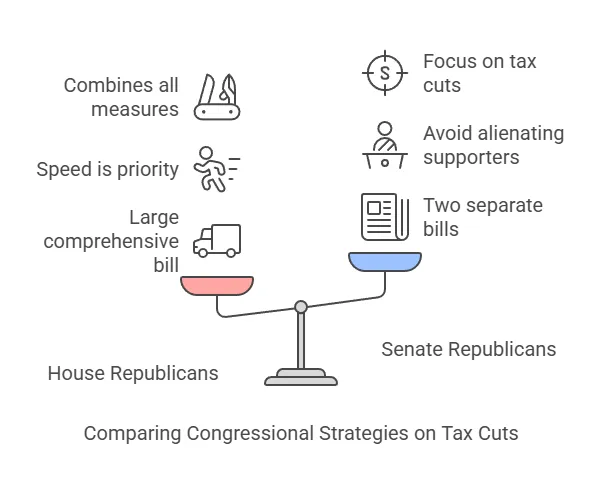Hey everyone, get ready and read this till the end because we are going to talk about one of the biggest issues in Washington right now. This article is about Trump tax cuts—so if you want to know how these tax cuts are creating a big political debate, you are in the right place!
- Child Tax Credit for 2025: Maximize Your Refund!
- Shocking Post-Election Market Trends Every Investor Must Know!
- Potential Tax Changes in 2025: Could You Receive an Extra $3,600-$5,000?
Background: The Magic of Reconciliation
Back in 2017, President Trump pushed his huge tax cut package through a process called reconciliation. This move allowed Congress to pass the Trump tax cuts with just a simple majority vote—no pesky filibusters stopping them. But here’s the catch: these tax cuts aren’t permanent. They’re set to expire unless Congress does something more about them.

House vs. Senate: A Clash of Strategies
There’s a big split in Congress over how to handle the future of these tax cuts:
- House Republicans want to roll everything into one giant bill. They believe that by bundling all of Trump’s proposals into a single, “big, beautiful” package, they can quickly lock in the benefits of the Trump tax cuts.
- Senate Republicans, however, are more cautious. They prefer a two-track approach—splitting the tax cuts from other fiscal measures—so they can avoid making too many concessions to political hardliners. Their worry is that if they mix everything together, they might have to compromise on key conservative principles, which could hurt their standing with voters.

Key Differences at a Glance
Below is a table that breaks down the differences between the two strategies:
| Aspect | House Approach | Senate Approach |
| Bill Structure | One large, comprehensive bill | Two separate bills |
| Political Risk | Fewer votes needed; speed is the priority | Avoids alienating hard-line supporters by isolating issues |
| Focus | Combines tax cuts with other fiscal measures | Focuses on tax cuts separately |
| Legislative Flexibility | Quick passage with narrow majority in the House | More cautious, allowing for detailed negotiations |
| Potential Impact on Deficit | Risk of a large, all-in-one package adding even more debt | May reduce immediate political fallout and better manage deficits |
The Real Scandal: Power and Politics
So, what’s really behind this Senate-House split? At its core, it’s not just about numbers or how much the tax cuts will boost business investment. It’s about power in Congress:
- House Republicans want quick wins and a unified approach to keep the momentum of the Trump tax cuts alive.
- Senate Republicans are worried about getting forced into deals that might hurt their long-term influence with their conservative base.
According to reports, including one from Reuters reuters.com, these internal battles are so intense that Speaker Mike Johnson’s budget plan is even at risk of collapse politico.com. And the AP News also points out that this isn’t merely a policy debate—it’s a proxy war for who gets to control the legislative agenda in Washington apnews.com.
What Does This Mean for the Future?
In the end, the debate over the Trump tax cuts is about much more than tax policy. It reveals the messy, backroom power struggles that define Washington politics today. With the House pushing for speed and unity and the Senate insisting on a more cautious, segmented approach, the fallout could affect everything from economic growth to how our national debt is managed.
So, while you might have heard all about the numbers and claims that these tax cuts will pay for themselves, remember: the real story here is about political survival and the tug-of-war for control in Congress. Keep your eyes peeled, because this political drama is far from over!
Stay tuned as more twists unfold in this high-stakes game of legislative chess, and remember—when it comes to Trump tax cuts, the drama is as big as the promises!
- Reasons to Choose Megapari for Sports Betting in India
- June 2025 Visa Bulletin Breakdown: No Progress for EB-1, EB-2 – What Now?
- $1500 Stimulus Checks 2025: Are You Eligible? Apply Now!
- $2000 Senior Stimulus Payment: Eligibility, Timing, & Resources
- Are You Getting a $1500 Stimulus Check in 2024? Here’s How to Find Out









